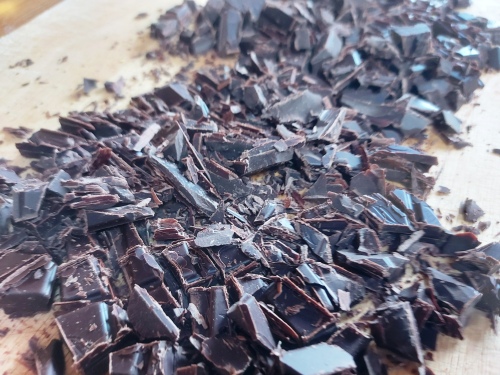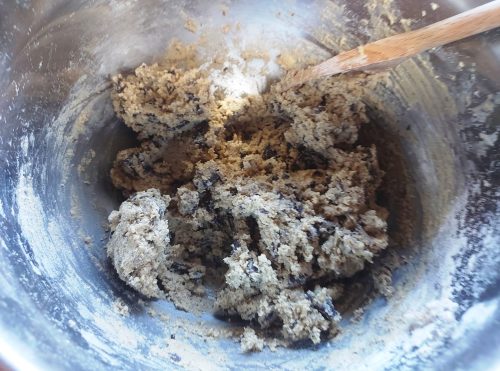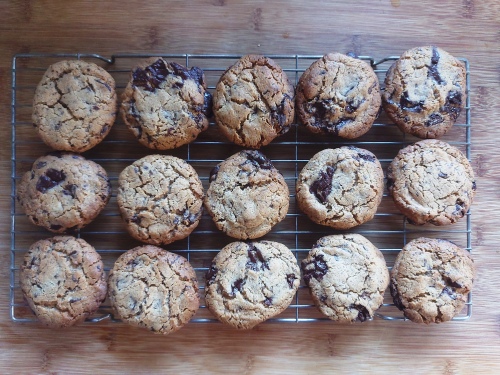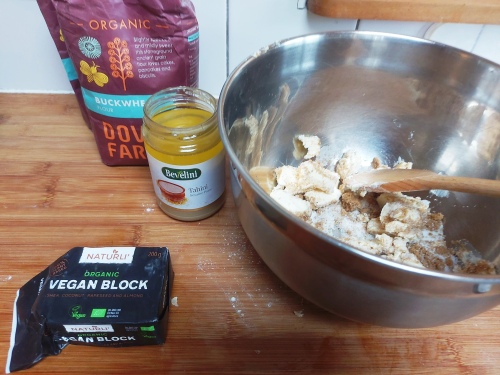Years ago, when I had my short-lived cookie stall on the local food market, I was never entirely satisfied with the free-from options I came up with for vegan, allergic, intolerant and orthorexic customers.
Via my sister in Sydney I’ve recently discovered Lancey Morris, aka Sweet Lancey, a very accomplished vegan baker who does a box delivery scheme over there. Wish I could order one of her treats boxes here! As I already love baking with nut butters (such as in my fave go-to cookie recipe), and use tahini (a kind of seed butter, if you will) in other cooking, both sweet (eg these brownies) and savoury (in hummus of course), it wasn’t a big leap to embrace her tahini chocolate chip cookies.
Lancey’s original recipe uses wheat flour, and that version is great. But I love using buckwheat flour too. Buckwheat (Fagopyrum esculentum) flour is just so tasty, and handily gluten-free if you’re of that inclination. It’s not even related to wheat, it’s related to rhubarb, sorrel and, er, Japanese knotweed.
The result is one of those great free-from recipes where you don’t eat them and muse about what’s missing.
These days, I’m finding Naturli’ Block is a great vegan butter-alternative here in the UK, as it doesn’t even include problematic palm oil* like most of the previously available non-dairy fats. It’s made with shea, coconut, rapeseed and almond. The tahini, meanwhile, is a great binder and enricher, so does a lot of the work of egg in other cookie recipes.
The other complication with vegan baking is chocolate. A lot of dark chocolate doesn’t contain dairy in the ingredients, but comes with the caveat “May contain nuts and milk”, due to potential contamination in the factory it’s made in. In terms of big brands available in British supermarkets, I got some Green & Blacks dark chocolate that was marked as vegan but this seems inconsistent across their range.
If you’re not vegan, this recipe works fine with dairy butter and whatever chocolate you prefer.
120g vegan butter, I use Naturli’ Block
65g caster sugar
50g light muscovado sugar, or light soft brown sugar
115g hulled or unhulled tahini
155g buckwheat flour
1/2 tsp baking powder
1/4 tsp bicarbonate of soda
1/4 tsp salt
1 tablespoon non-dairy milk, soy, oat, almond etc – though if you have particularly runny tahini, you may not need this
200g vegan chocolate chips, or chocolate cut into small pieces
Sea salt and sesame seeds, to taste
1. Cream together butter and sugars.
2. Add the tahini and keep beating until smooth.
3. Sieve together the flour, baking powder and bicarbonate of soda and add to the mixture, along with the salt.
4. Combine to clear, ie no visible bits of flour.

5. Add the milk and chocolate.

6. Wrap the dough (total weight approx 700g) and rest in fridge for half an hour or so.
7. Heat the oven to 180C and prepare baking sheets with silicon or baking parchment.


8. Make balls of dough. If you scale them at 40g, the recipe will make 18-ish.
9. Put the balls of dough on the prepared trays and push down slightly. Leave space, as they will spread.
10. Bake for around 18 minutes until nicely browned.
11. Cool on a rack.
I’ve also done another version where I chocolated them up even more, using 135g buckwheat flour, 20g cocoa and added some cocoa nibs. I do love trying to get as many chocolate products as possible into the same cookie. See my quintuple chocolate chip cookie recipe.
* This is of course a big topic, but palm oil production is deeply problematic. It’s often grown on huge plantations that have been created where tropical rainforest has been cleared, notably in Indonesia and Malaysia (which between them produce 90% of the world’s palm oil). So a hugely diverse natural environment has been destroyed and replaced by monoculture agriculture, where very few wild animals can survive.
Yet again, humanity deprives our fellow residents of this planet of their home. Just so we can have a cheap ingredient in our cheap supermarket biscuits. And indeed most supermarket biscuits do contain palm oil. Its use is very widespread in artificially cheap industrial foods – artificially cheap in that the cost to the consumer doesn’t factor in the cost to the planet. Which is soomething that has very much come back to bite us on the arse the last few years. Destroying rainforest exposes us to zoonotic organisms – that is, pathogens that jump from animals to humans, eg with SARS-CoV-2, which scientists mostly agree now jumped from bats or other mammals to humans.
Some products say they contain “sustainable palm oil” but I’ve never seen a credible explanation of what that means.










